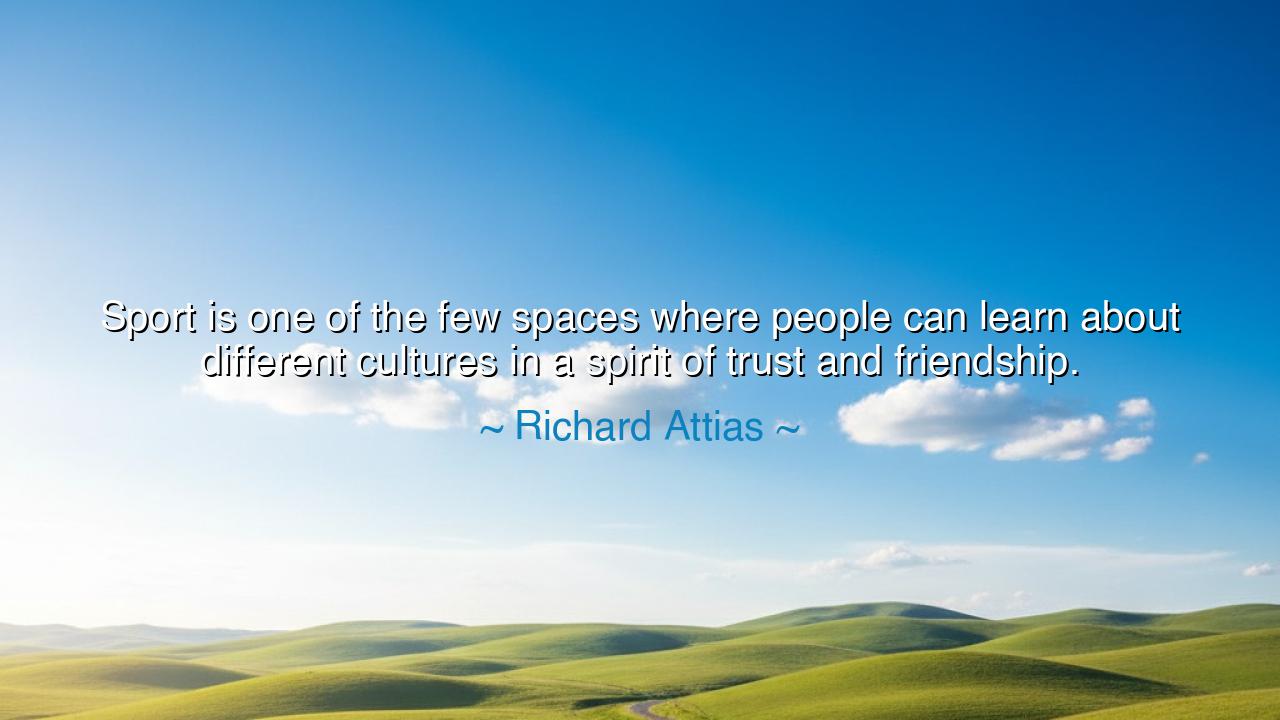
Sport is one of the few spaces where people can learn about
Sport is one of the few spaces where people can learn about different cultures in a spirit of trust and friendship.






"Sport is one of the few spaces where people can learn about different cultures in a spirit of trust and friendship." These words from Richard Attias illuminate the transformative and unifying power of sport in the modern world. In a time when the world is often divided by national borders, ideologies, and cultural misunderstandings, sport offers a rare space where people from all walks of life come together to engage in a shared pursuit. Sport is not just a physical activity; it is a universal language that transcends the barriers of race, religion, and culture. Through the spirit of competition, mutual respect, and the joy of achievement, sport fosters trust, understanding, and friendship between individuals who may otherwise never have had the opportunity to connect.
In the ancient world, the importance of shared activities—whether in battle, competition, or the exchange of ideas—was revered. The Olympic Games in ancient Greece stand as a prime example of how sport was used to bring together people from various regions, languages, and backgrounds. The Games were not just contests of physical strength and skill, but a celebration of unity and cultural exchange. For the ancient Greeks, the Olympics were a sacred event where rivals put aside differences and celebrated the human spirit through competition and respect. It was a space where people learned from one another, not just through rivalry, but through the shared joy of sport and the spirit of the Games.
Attias’s quote highlights how sport, like the ancient Olympic Games, remains a unique platform for learning about different cultures. It is in the arena of sport that we often see individuals from diverse backgrounds come together with a single goal—whether that goal is victory, teamwork, or personal growth. Take, for instance, the World Cup in soccer—a global event where nations from every corner of the earth compete, but more importantly, where people of various cultures interact, form friendships, and gain understanding. The World Cup serves as a reminder of the humanity that connects us all, for though we may come from vastly different backgrounds, on the field, we are united by a common passion for the game.
One of the most powerful examples of sport’s ability to foster trust and friendship comes from the story of Nelson Mandela and the 1995 Rugby World Cup. In the years following apartheid in South Africa, the country was deeply divided along racial lines. However, when the South African rugby team, led by Francois Pienaar, won the World Cup, Mandela saw an opportunity to unite his fractured nation. He famously wore the jersey of the team’s captain, Pienaar, symbolizing his trust and faith in the power of sport to heal and bridge divides. Mandela understood that sport, when approached with the right spirit, can transcend even the deepest of political and cultural barriers. It was through the shared experience of supporting their team that the South African people, regardless of race or history, came together in a powerful moment of unity.
In sport, as in the story of Mandela’s leadership, there is a reminder that trust is not just given, but earned through shared experiences and mutual respect. Sport teaches us that, regardless of where we come from or what we believe, we are all united in our human desire to excel, to challenge ourselves, and to grow. It provides a rare space where we can learn not just about physical prowess, but about each other’s values, traditions, and stories. Attias’s insight encourages us to embrace this opportunity, to see sport as a means of connection, a way to bridge the gaps between cultures, and to foster friendships that might otherwise never come to fruition.
The lesson is clear: sport is one of the few remaining spaces where people can truly engage with one another across the lines of division that often separate us. It teaches us that there is power in shared experiences—in the tension of competition, the joy of victory, and the grace of defeat. Through these experiences, we learn, we grow, and we come to understand the world around us. It is through these moments that we are reminded of our common humanity, that despite our differences, we share the same desire for connection, achievement, and respect.
In our own lives, we must seek to use sport and other shared experiences to foster understanding, trust, and friendship. Whether through formal competitions, community activities, or personal engagement with others, we should look for ways to embrace the spirit of sport—a spirit that transcends competition and embraces human connection. Let us take the lessons from ancient games, from the World Cup, and from leaders like Mandela, and carry them into our daily lives. May we find strength in our differences and unity in our shared pursuits, knowing that through sport and friendship, we can enrich not only our own lives but the world around us.






AAdministratorAdministrator
Welcome, honored guests. Please leave a comment, we will respond soon